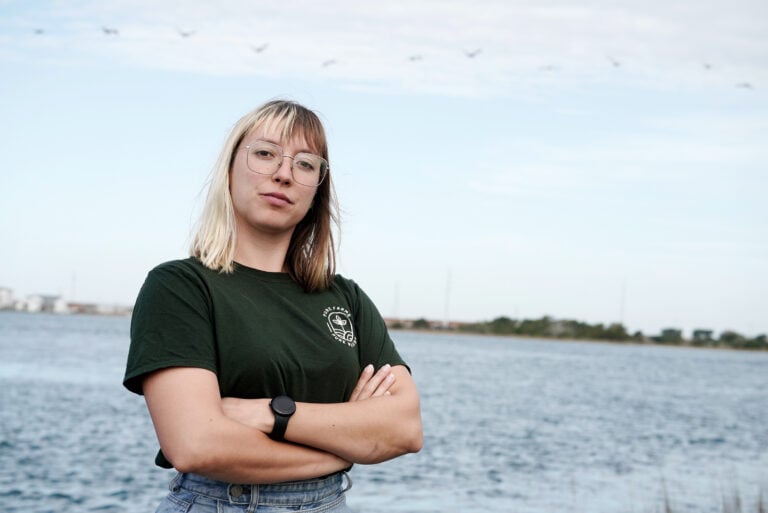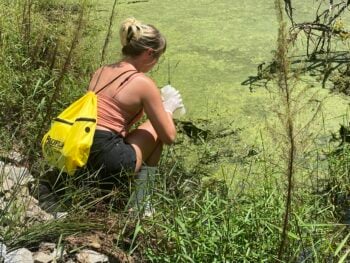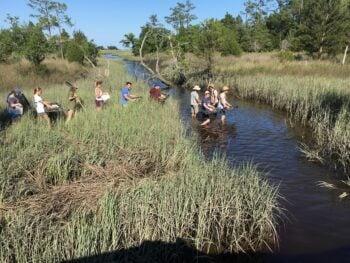Who Is Waterkeeper: Riley Lewis, White Oak Waterkeeper
By: Thomas Hynes

In 2022, Riley Lewis accepted her dream job as the White Oak Waterkeeper in North Carolina, a position that allowed her to apply her education and experience in coastal and ocean policy to protect the region’s vital water systems.
The path to this role wasn’t easy or expected.
After earning a master’s degree in Coastal and Ocean Policy from the University of North Carolina at Wilmington, Riley found herself entering the job market just as the COVID-19 pandemic took hold.
Opportunities in her field were limited, and niche roles for coastal and ocean policy experts were few and far between. So, she stayed in Wilmington, where she’d completed her studies, and worked as an AmeriCorps member. It was there that she first encountered the Waterkeeper movement, learning about Kemp Burdette, the Cape Fear Riverkeeper, and the larger network of community advocates fighting to protect waterways in communities around the world.
The Waterkeeper Alliance mission to protect the right to clean water for all, resonated deeply with Riley. As she puts it, “It filled a huge gap in service,” offering a chance to bridge academic knowledge with real-world environmental challenges.
She soon discovered that these positions are rare, and when one opened up at the White Oak Waterkeeper, Riley was eager to apply. Even though the position was located in Morehead City, North Carolina—two hours away from Wilmington and a place she’d never visited—she knew it was an opportunity too good to pass up.
“I saw the job description and thought this is my dream job,” says Riley. “It’s the overlap of water quality, human health, and making things happen out of research. I am incredibly thankful that I ended up in this position. And not everyone gets to say that.”
Unlike some other Waterkeeper groups, Riley’s jurisdiction covers a vast and varied landscape. Her work encompasses four rivers—the New River, White Oak River, Newport River, and North River—along with an extensive barrier island system and seven different sounds.
“There’s so much to love about this area,” she says. “From a purely superficial standpoint, I live in sight of waterways. I have rivers, and I have the ocean. I can be anywhere in my jurisdiction and not be more than 30 minutes from the coast. It’s a privilege.”
However, the picturesque landscapes and serene coastlines belied the significant challenges that Riley faces in her role. One of the most pressing issues is development. As the region grows, the relentless push for new construction often ignores the fragile ecosystems that support the area’s unique natural beauty.
“The development here is unsustainable,” Riley explains. “There’s not enough consideration given to the local ecosystems that make the area livable. Clear-cutting wetlands destroys vital habitats for countless species, but it also removes a natural flood prevention system. Coastal Carolina is flat, so filling in wetlands doesn’t solve flooding; it makes it worse.”
Another major concern is the lack of adequate wastewater infrastructure. Many homes and businesses rely on septic systems, which pose a serious risk of contamination when water levels rise, a problem exacerbated by the loss of wetlands. In Beaufort, North Carolina, some of the town’s sewer pipes are made of aging terracotta, which crack and leach waste into local waterways, further polluting the water and threatening both public health and the local fishing industry.
 Animal agriculture, particularly factory farms, also contributes significantly to water pollution. In North Carolina, poultry farms can operate with little oversight, often dumping waste onto fields at levels the soil can’t absorb. After rain, this excess waste washes into nearby rivers and streams, worsening the water quality and harming ecosystems.
Animal agriculture, particularly factory farms, also contributes significantly to water pollution. In North Carolina, poultry farms can operate with little oversight, often dumping waste onto fields at levels the soil can’t absorb. After rain, this excess waste washes into nearby rivers and streams, worsening the water quality and harming ecosystems.
“In North Carolina, poultry farms are practically unregulated,” says Riley. “Anyone can put one anywhere. We can raise thousands of chickens without a permit, and nobody tracks what happens to the waste. The state doesn’t even require these facilities to report their locations.”
For Riley, this isn’t just an environmental issue—it’s an economic one as well. Factory farms that operate without transparency or accountability often undercut smaller, sustainable farms that are working hard to produce food responsibly. To support these local farmers, Riley highlights their work on Coastal Carolina Riverwatch’s social media every Friday, helping raise awareness about where to buy fresh, local produce.
In addition to her advocacy work, Riley fosters community connections by hosting a monthly working group for residents to share concerns and ideas about local environmental issues. By bringing together like-minded individuals, she hopes to amplify their voices and collaborate on solutions to safeguard the region’s natural resources.
 “I just want people to understand the importance of protecting these resources,” she says. “If we lose our coastal ecosystems, nobody’s going to want to live here. If you destroy a wetland, you can’t just build something to replace it. What nature provides is free and beautiful, and it does things we can’t replicate. Protecting these resources may not directly generate revenue, but it stops a lot of money from being spent on fixing problems later on.”
“I just want people to understand the importance of protecting these resources,” she says. “If we lose our coastal ecosystems, nobody’s going to want to live here. If you destroy a wetland, you can’t just build something to replace it. What nature provides is free and beautiful, and it does things we can’t replicate. Protecting these resources may not directly generate revenue, but it stops a lot of money from being spent on fixing problems later on.”
For Riley, the job of White Oak Waterkeeper is about more than just conservation; it’s about ensuring that future generations can enjoy the same natural beauty she does. It’s about making sure that people—both those who live in the region and those who rely on its resources—understand the critical role water and ecosystems play in maintaining a livable, sustainable environment. And it’s about holding those in power accountable for the choices they make today, knowing that those decisions will shape the world for years to come.
Watch this video to learn more about Riley’s work and tune into series two of Waterkeeper Alliance’s “Equity In Every Drop” podcast, which explores the true costs of factory farms. To learn more about Waterkeeper Alliance’s advocacy efforts on these issues, visit our Pure Farms, Pure Waters campaign.
All photos courtesy of Riley Lewis.